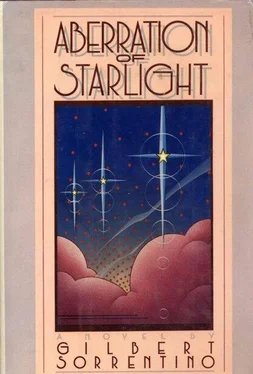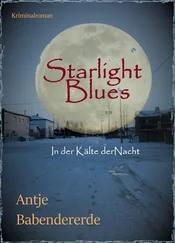I’m not going to talk about your mother. I had my cross too. I’m talking about one thing and it’s not two things, this Thebus article. He’s a sneaky-looking gazabo to me and what is it he wants with you? A woman with a ten-year-old son. Oh, I’m just an old fart and I can’t see what’s right in front of my eyes.
I’m entitled to some life, Poppa.
Well, you have your life, but I won’t be all smiles at this moustached article of a divorced man. The blind leading the blind, I say. I saw the whole thing from the start when the man jumped up from the porch dressed up like Astor’s pet horse and a book under his oxter to say hello to you. The minute we got here. We didn’t get out of the road when he was there all smiles and his pipe stuck in his mouth.
He said hello to you, too, Poppa. You’ve forgotten that.
To me! Ah, and I wonder why he’d do that? Something else the old geezer can’t see through.
But you didn’t see through anything when you let him carry, oh yes, let him carry all the valises upstairs. Oh no, I don’t remember a word out of you except Mister Thebus this and Mister Thebus that. Jesus, Mary and Joseph!
That’s before he showed his true colors. If I knew, I wouldn’t have given him the sweat off an ice pitcher. I don’t like the man one iota, just like I didn’t like that greaseball you married.
You? You were against my marrying Tony? You?
You know goddamn well!
Oh Poppa. My God, what short memories we have. My God.
I never liked that damn dago and your mother told you what she thought too, but you wouldn’t listen to anybody, you knew better.
Momma? Momma thought Tony was the most wonderful thing that ever came down the pike! At first. At first until she saw how happy we were and we moved away from Senator Street to that little house in Flatbush. That stuck in her craw, she was green with jealousy, God forgive me. Please, Poppa. Don’t tell me about Momma and Tony.
You should show some respect for your mother, she not in her grave a year.
Oh Poppa. I’ve thrown away my whole life on my mother.
And on me too?
Oh Poppa.
I’m telling you one thing, Skip. This Thebus pup is two-faced and up to no good. You mark my words.
Poppa, I’m not doing anything wrong. He’s full of fun. And he’s got his own cross to bear. Believe it or not.
Did it himself or I’m no judge.
Oh Poppa, can’t you have some feeling for somebody else, somebody outside of — God almighty.
Outside of what? Me? Oh yes, sure, certainly, it’s your selfish father again, your egotistical father who puts the roof over your head, pays for everything, drops for the boy’s eyes, glasses, everything.
I’m going in, Poppa. I want to take a nap.
Mm-hm, sure. Take your beauty rest to make sure you look like a girl. Go ahead. Go, go. Worked my fingers to the bone for all of you and this is the thanks I get. For all of you.
What was John’s most treasured possession?
A letter from William X. Whitestone, the text of which follows:
Dear McGrath:
Bill Sutton has called to my attention your work on the Roseville Dress account. As you know, we have had no end of trouble here at National, in establishing the right line to take with Roseville and Ben Gelbstein. Dun & Bradstreet has been of some help, of course, Ed Murray in particular. But in looking over the careful file you have kept on the account in its business dealings with Textile over the years, as well as your notes and recommendations therein, it is clear that your attention to this difficult account has smoothed our path immeasurably.
You know, John, in what esteem I have always held your work as a credit investigator. This Roseville job reinforces my opinion of your skill and dedication to your accounts. Let me say that I and the National Credit Office as well as the entire credit business in New York is in your debt for this expert work.
My sincere good wishes,
Bill Whitestone
What were Bridget’s last words to John?
“The reason you come to the hospital every night is because you’re afraid what the goddamn neighbors will think, you can’t fool me.”
Name a few of the things that John came to loathe as he grew older.
The kitchen utensils; the metal clothes hamper outside the bath-
room door; the bathroom door that refused to close all the way; the insurance man, Mr. Levine; the laundryman, Phil, of Crescent Laundry; the dank and rusty-colored shower curtain; the broken Morris chair; head cheese and boiled potatoes; Woolworth’s sugar cookies; the artificial Christmas tree; boiled spareribs and cabbage; Bud Halloran; Bridget’s corsets; Billy’s crossed eye; Fibber McGee and Molly; turkey stuffing; rush hour on the Sea Beach Express; mandolin music; the Irish; Jimmy Kenny’s mouth; Mr. Svenson, the landlord; the front room in which he and Billy slept after Bridget’s death; any creche anywhere; the dining room table; the revealing clothing of young women; Dr. Drescher; all of Bridget’s relatives; the movies; all holidays.
What did he think of Bridget’s dream books?
He thought that they were foolish items for foolish people.
Did he ever consult them?
Once. He consulted What Your Dreams Mean, 1000 Dreams and Their Meanings, and Find Out What Your DREAMS Mean.
As to?
The meaning of the following dream: Jean Whiting is dressed in the clothing in which he first saw Bridget. Bridget is outside the door of their apartment, but the interior of the apartment is that of a cottage that he and Bridget once rented in the Rockaways. Bridget is playing his mandolin. She opens the door and, smiling, says, “She’s got a nice pussy, hasn’t she?” He turns to see Jean Whiting naked and has an orgasm. It might be noted that the dream books did not assist him in the interpretation of this dream.
What tradition did he keep with religious devotion?
On New Year’s Day, he visited all his surviving relatives to wish them the joy of the new year; at home, he made certain that he had on hand a supply of ladyfingers (bought at Ebinger’s Bakery) and a bottle of sherry with which to refresh any guests who dropped in to wish him and the family the joy of the new year.
What did Bridget think of this tradition?
That it was an Orange Church of Ireland affectation.
What did John think of Roman Catholicism?
That it was shanty Irish hocus-pocus to keep the thick Micks ignorant.
Speaking of shanty Irish, what were some of the opinions expressed by Bridget’s relatives at her wake?
That she looked wonderful; that she looked beautiful; that she looked better than she did alive; that she looked as pretty as she did when she was a girl; that she looked alive; that she looked as if she’d open her eyes and talk bejesus; that it was all for the best; that she was with God in heaven; that she had gone to a better place; that she was spared a lot of suffering going when she did; that she didn’t suffer at all thanks be to God; that she smiled like an angel after she took communion, the Father said; that Marie’s eyes were red as a beet from crying; that poor John looked as if he’d be next, worn out with grief as he was; that what John needed was a ball or two to buck him up, it never hurt any man; that Bridget was so young a woman; that the good always die young; that poor Marie was motherless too now; that the poor grandson didn’t know what to make of it all, God save the poor little cockeyed runt of a thing; that the prayer cards were bejesus works of art; that the undertaker’s eldest son was a sissy; that begod who could blame the boy growing up in an atmosphere like that; that the flowers were the most beautiful anybody had ever seen anywhere; that the casket must have cost a pretty penny; that the white Missal and white rosary that Bridget clasped in her hands were for certain the very same her mother God bless her gave her for her First Communion; that she was to be buried next to her mother in Holy Cross as was only right; that poor John, being an Orangeman, was now surely separated from her forever, saving of course in heaven if God was good.
Читать дальше












